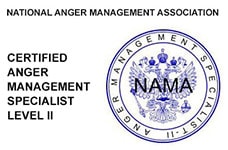
My Approach to Anger Management Counseling
My anger management approach is based on the following premises:
- Anger is a natural and normal emotional reaction in the presence of a real or perceived threat, aversive event, insult, injustice, or frustration.
- Anger is caused by perceived feelings of helplessness and need to control situations, people, and circumstances.
- Anger signals a blockage in meeting personal wants, needs, and goals, or that something is wrong.
- Anger fosters personal growth and significance, improves relationships, and motivates people to accomplish personal goals when it is expressed in a healthy manner.
- Anger is good when used as an agent for change.

What to expect
In my clinical work, I focus on providing clients with the
knowledge of how to effectively deal with anger. Although some of
us might think it is best to eliminate anger, I caution against
this goal. Completely eliminating it is an impossible and
unrealistic goal, as well as a dangerous one. Our anger is a sign
that something inside our heart and mind does not feel right
anymore. Therefore, it is vital to identify the message 'our
anger' is trying to communicate to us, and learn to address it in
a manner that reestablishes inner-equilibrium. By ignoring the
message, which most of us do, we subject ourselves to ongoing
emotional pain and adjacent destructive consequences.
So how can it be possible to effectively cope with
anger without eliminating it?
For most people, anger management counseling is the answer.
What is anger management?
Anger management is a process not an event. It requires time,
commitment, and active participation on the client's part. This
process refers to learning what happens in our mind and body when
we get angry, why we tend to respond to our inner world and outer
circumstances this way, and how we can change our perception to
respond in a healthier manner. Therefore, the format I created
through years of practice and experience provides my clients with
multiple benefits. In addition to learning how to cope with
anger, most of my clients learn to deal with stress better, work
through personal trauma(s), find aid in coping with difficult and
upsetting emotions, and develop healthier ways to balance their
lives.
Why time? Most of us are pressured by time constraints and want things to change quickly. When we are dealing with anger issues, allowing yourself time to learn and try new skills is important. Change does not happen overnight. The way we currently cope with life challenges often took years of practice and repetition. Therefore, having a realistic understanding that at least 6 to 8 weeks might be needed to harvest the results of your efforts is a reasonable time frame to learn how to self-manage your anger. Of course, results can be evident sooner or take longer depending on each client's situation, personality, and psychological make-up.
Why commitment? Commitment refers to the dedicated effort to be engaged and stay involved with the work required by anger management counseling. Wanting to make changes for others in order to rescue relationships and jobs can help, but it would not ensure the same outcome if you are doing this work to become a better version of yourself. Therefore, my experience working with clients dedicated and committed to change yields noticable changes in 3 to 4 sessions.
Why active participation? Active participation implies that you - the client, are your own agent of change. Simply attending anger management counseling will not change anything just by your physical presence. Change requires personal effort to open up and try new ways of looking at yourself and others. It implies recognizing the discomfort of shifting your perception on seeing the world through different lenses, and experiencing painful emotions that are masked by your anger. Through this emotional labor, change will emerge and you will discover a new side of yourself – a more grounded and balanced side – that can handle the ups and downs of life smoother.


